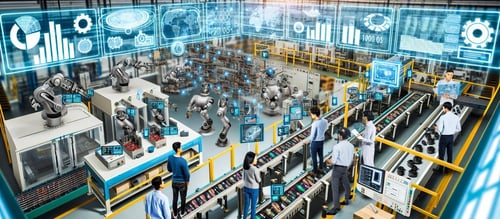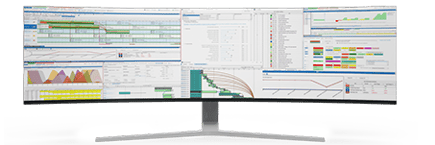Autonomous Supply Chain Decision-Making
With the rise of advanced technologies and the advent of Industry 4.0, supply chain managers are faced with the challenge of optimizing processes and making decisions in increasingly complex environments. This is where the concept of autonomous supply chain decision-making comes into play.
In this blog post, we will look into the realm of autonomous supply chain decision-making, exploring its benefits, challenges, and the integration of advanced planning and scheduling (APS) software like PlanetTogether with leading ERP, SCM, and MES systems such as SAP, Oracle, Microsoft, Kinaxis, and Aveva.

The Evolution of Supply Chain Management
Before we look into the specifics of autonomous decision-making, let's take a step back and understand the evolution of supply chain management. Traditional supply chain management involved manual processes, limited data visibility, and reactive decision-making. However, with the advancement of technology, supply chain management has undergone a significant transformation.
The integration of ERP, SCM, and MES systems has enabled organizations to streamline their operations, improve inventory management, and enhance collaboration across various departments. Yet, despite these advancements, supply chain managers still face challenges such as demand volatility, supply chain disruptions, and the need for real-time decision-making.
This is where autonomous supply chain decision-making enters the picture.

Understanding Autonomous Supply Chain Decision-Making
Autonomous supply chain decision-making involves leveraging advanced technologies such as artificial intelligence (AI), machine learning (ML), and predictive analytics to automate decision-making processes within the supply chain. By analyzing vast amounts of data in real-time, autonomous systems can identify patterns, predict future outcomes, and recommend optimal courses of action.
These systems not only improve the speed and accuracy of decision-making but also enable organizations to adapt quickly to changing market conditions and customer demands. Moreover, autonomous supply chain decision-making frees up valuable time for supply chain managers, allowing them to focus on strategic initiatives rather than day-to-day operational tasks.
Benefits of Autonomous Supply Chain Decision-Making
Enhanced Efficiency: Autonomous systems can analyze data and make decisions much faster than humans, leading to improved operational efficiency and reduced lead times.
Improved Accuracy: By leveraging advanced algorithms, autonomous systems can make more accurate predictions and recommendations, thereby minimizing the risk of errors and inefficiencies.
Real-Time Insights: Autonomous systems provide real-time visibility into key performance indicators (KPIs), enabling supply chain managers to make informed decisions based on up-to-date information.
Proactive Risk Management: Autonomous systems can identify potential risks and disruptions in the supply chain before they occur, allowing organizations to take proactive measures to mitigate them.
Cost Savings: By optimizing processes and reducing waste, autonomous supply chain decision-making can lead to significant cost savings for organizations.

Challenges of Autonomous Supply Chain Decision-Making
While the benefits of autonomous supply chain decision-making are clear, implementing and integrating these systems into existing infrastructure pose several challenges:
Data Integration: Integrating data from multiple sources such as ERP, SCM, and MES systems can be complex and time-consuming.
Change Management: Adopting autonomous supply chain decision-making requires a cultural shift within the organization, as employees may be resistant to change.
Skill Gap: Organizations may lack the necessary expertise and talent to develop and maintain autonomous systems, requiring investments in training and development.
Security Concerns: Autonomous systems rely on data, making them vulnerable to cyber threats and security breaches.

Integration with PlanetTogether and Leading ERP, SCM, and MES Systems
To overcome these challenges, organizations can leverage advanced planning and scheduling (APS) software like PlanetTogether, which integrates seamlessly with leading ERP, SCM, and MES systems such as SAP, Oracle, Microsoft, Kinaxis, and Aveva.
By integrating PlanetTogether with these systems, organizations can:
Improve Data Visibility: PlanetTogether collects and analyzes data from various sources, providing supply chain managers with a comprehensive view of their operations.
Enhance Decision-Making: By combining data from ERP, SCM, and MES systems with advanced algorithms, PlanetTogether can make real-time recommendations for optimal production schedules and resource allocation.
Streamline Processes: PlanetTogether automates planning and scheduling processes, reducing the need for manual intervention and improving overall efficiency.
Ensure Scalability: PlanetTogether is highly scalable and can adapt to the evolving needs of industrial manufacturing facilities, whether they are small operations or large enterprises.
Autonomous supply chain decision-making represents the next frontier in industrial manufacturing, enabling organizations to optimize processes, improve efficiency, and drive competitive advantage. By leveraging advanced technologies and integrating APS software like PlanetTogether with leading ERP, SCM, and MES systems, supply chain managers can make faster, more accurate decisions that align with business objectives.
As we continue to embrace digital transformation and Industry 4.0, autonomous supply chain decision-making will play an increasingly vital role in shaping the future of industrial manufacturing. It's time for supply chain managers to embrace this fundamental change and unlock the full potential of their supply chains.
Are you ready to take your manufacturing operations to the next level? Contact us today to learn more about how PlanetTogether can help you achieve your goals and drive success in your industry.



